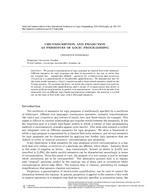Circumscription and Projection as Primitives of Logic Programming
From International Center for Computational Logic
Circumscription and Projection as Primitives of Logic Programming
Christoph WernhardChristoph Wernhard
Christoph Wernhard
Circumscription and Projection as Primitives of Logic Programming
In M. Hermenegildo and T. Schaub, eds., Technical Communications of the 26th International Conference on Logic Programming, ICLP'10, volume 7 of Leibniz International Proceedings in Informatics (LIPIcs), 2010. Schloss Dagstuhl–Leibniz-Zentrum fuer Informatik
Circumscription and Projection as Primitives of Logic Programming
In M. Hermenegildo and T. Schaub, eds., Technical Communications of the 26th International Conference on Logic Programming, ICLP'10, volume 7 of Leibniz International Proceedings in Informatics (LIPIcs), 2010. Schloss Dagstuhl–Leibniz-Zentrum fuer Informatik
- KurzfassungAbstract
We pursue a representation of logic programs as classical first-order sentences. Different semantics for logic programs can then be expressed by the way in which they are wrapped into - semantically defined - operators for circumscription and projection. (Projection is a generalization of second-order quantification.) We demonstrate this for the stable model semantics, Clark's completion and a three-valued semantics based on the Fitting operator. To represent the latter, we utilize the polarity sensitiveness of projection, in contrast to second-order quantification, and a variant of circumscription that allows to express predicate minimization in parallel with maximization. In accord with the aim of an integrated view on different logic-based representation techniques, the material is worked out on the basis of first-order logic with a Herbrand semantics. - Bemerkung: Note: ,(Extended version: http://cs.christophwernhard.com/papers/logprog2010extended.pdf)
- Forschungsgruppe:Research Group: WissensverarbeitungKnowledge Representation and Reasoning
@inproceedings{W2010,
author = {Christoph Wernhard},
title = {Circumscription and Projection as Primitives of Logic Programming},
editor = {M. Hermenegildo and T. Schaub},
booktitle = {Technical Communications of the 26th International Conference on
Logic Programming, {ICLP'10}},
series = {Leibniz International Proceedings in Informatics (LIPIcs)},
volume = {7},
publisher = {Schloss {Dagstuhl{\textendash}Leibniz-Zentrum} fuer Informatik},
year = {2010},
doi = {10.4230/LIPIcs.ICLP.2010.281}
}
